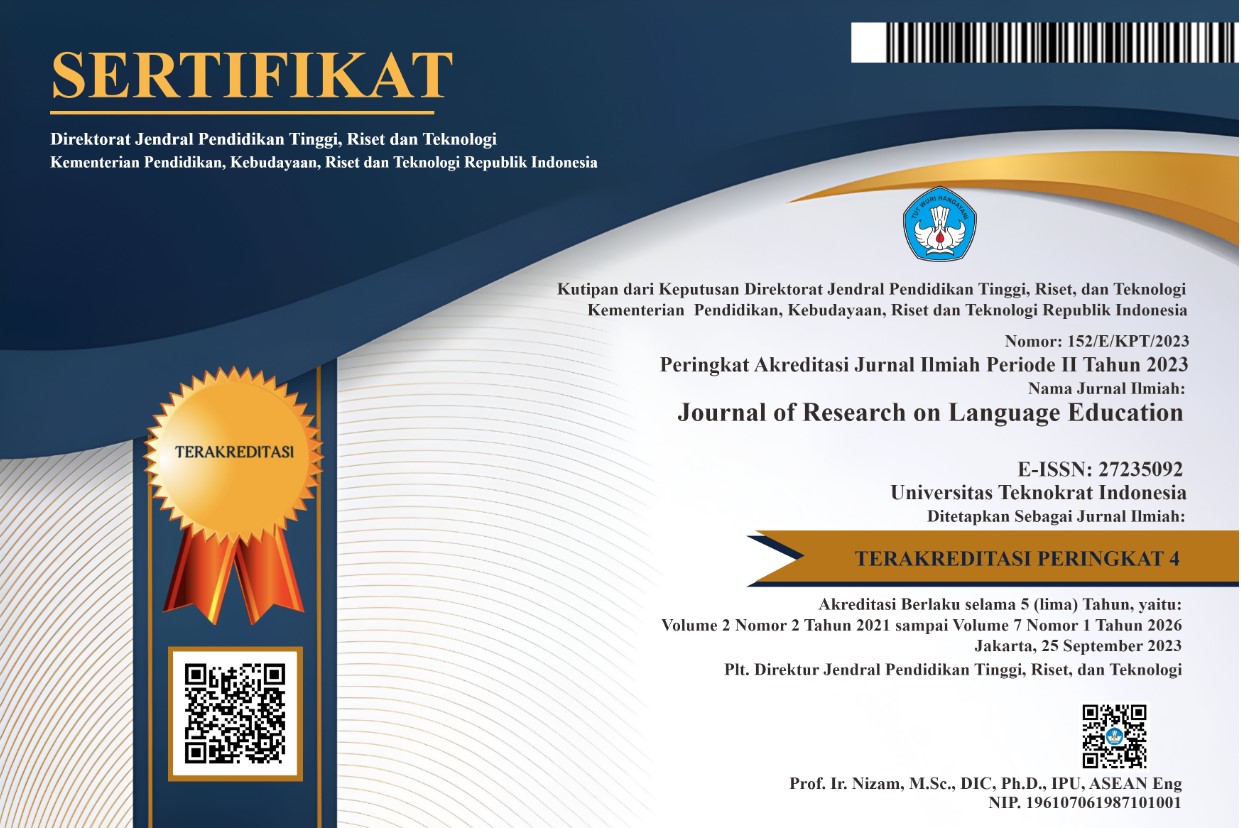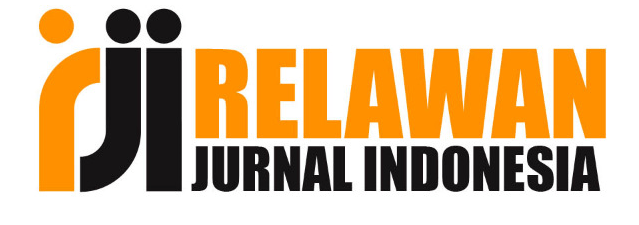STUDENTS’ READINESS IN USING TECHNOLOGY DURING COVID-19 PANDEMIC
Abstract
To prevent the spread of Covid-19, online learning or LFF is implemented. LFH shifted formal education practice from the classroom (on-site) learning to online learning. All subjects in schools are conducted online, including English subjects. One of the software applications that can assist in English teaching and learning online was Learning Management Systems. One LMS that can be used as a learning platform is Moodle. The friendly tools that Moodle offers help students to adapt quickly to this platform. However, with this sudden shifting between offline to online environments, the students need to adjust without maximum preparation. Therefore, in implementing Moodle, the teachers should know students' readiness and perception of using Moodle as an English learning media. In this research, the researchers apply survey research that explores students' readiness and perceptions towards the use of Moodle in learning English during the pandemic Covid-19. The instrument uses the questionnaire, and the participants are 100 students of SMK Yadika Bandarlampung. The result of this research shows that students of SMK Yadika Bandarlampung are ready to implement Moodle as their English learning media. They also had a positive perception toward Moodle during their time using Moodle. However, the students still face some problems such as connection and internet data, which often becomes a barrier for them in following Moodle activities.
Keywords
Full Text:
PDFReferences
Akaslan, D., & Law, E. L.-C. (2011). Measuring Student E-Learning Readiness: A Case About the Subject of Electricity in Higher Education Institutions In Turkey. ICWL (International Conference on Web-Based Learning), 209-218.
Aparicio, M., Bacao, F., & Olivera, T. (2016). An E-Learning Theoretical Framework. Journal of Educational Technology Systems, 19(1), 292-307.
Ary Et Al. (2010). Introduction to Research in Education. USA: Wadsworth
Aydin, C. H., & Tasci, D. (2005). Measuring Readiness for E-Learning: Reflections from An Emerging Country. Educational Technology & Society, 8(4), 244-257.
Caliskan, S., Tugun, V. & Uzunboylu, H. (2017). University Students’ Readiness for E-Learning. ENSAYOS, Revista De La Facultad De Educación De Albacete, 32(2). 35-45.
Chang, V., & Fisher, D. (2003). The Validation and Application of A New Learning Environment Instrument for Online Learning in Higher Education. Technology-Rich Learning Environments: A Future Perspective (Pp. 1-20).
Costa, C., Alvelos, H., & Teixeira, L. (2012). The Use of Moodle E-Learning Platform: A Study in A Portuguese University. Procedia Technology, 5. 334-343.
Creswell, J. W. (2009). Research Design: Qualitative, Quantitative and Mixed Method Approach (3rd Edition). United States of America: SAGE Publications, Inc.
Dray, B. J., Lowenthal, P. R., Miszkiewicz, M. J., Ruiz‐Primo, M. A., & Marczynski, K. (2011). Developing an Instrument to Assess Student Readiness for Online Learning: A Validation Study. Distance Education, 32(1), 29-47.
Ellis, R. K. (2009). A Field Guide to Learning Management System. America: American Society for Training and Development (ASTD)
Gunantar, D. A. (2016). The Impact of English as An International Language on English Language Teaching in Indonesia. Language Circle: Journal of Language and Literature, 10(2). 41-51.
Hair, J. F., Anderson, R. E., Tatham, R. L., & Black, W. C. (2010). Multivariate Data Analysis. Seventh Edition. New Jersey: Prentice-Hall International, Inc.
Hülmbauer, C., Böhringer, H., & Seidlhofer, B. (2008). Introducing English as A Lingua Franca (ELF): Precursor and Partner in Intercultural Communication. Synergies Europe, 3(9), 25-36.
Hung, M. L., Chou, C., Chen, C. H., & Own, Z. Y. (2010). Learner Readiness for Online Learning: Scale Development and Student Perceptions. Computers & Education, 55(3), 1080-1090.
Jayanti, F. G., & Norahmi, M. (2014). EFL: Revisiting ELT Practices in Indonesia. Journal on English as A Foreign Language, 4(1), 5-14.
Kurtanto, E. (2017). Keefektifan Model Pembelajaran Daring Dalam Perkuliahan Bahasa Indonesia Di Perguruan Tinggi. Journal Indonesian Language Education and Literature, 3(1), 99-110.
Michotte, A. (2019). The Perception of Causality. London: Routledge.
Moodle. (2020). Retrieved November 10, 2020, From About Moodle: Moodle.Org
Nguyen, T. (2015). The Effectiveness of Online Learning: Beyond No Significant Difference and Future Horizons. MERLOT Journal of Online Learning and Teaching, 11(12), 309-3019.
Oktaviani, D. N., Sholikhakh, R. A., & Lestiana, H. T. (2018). Persepsi Mahasiswa Terhadap Kepraktisan Learning Management System (LMS) Moodle Berbasis Teori Behaviorisme. UNION: Jurnal Ilmiah Pendidikan Matematika, 6(3), 307-316.
Putri, E., & Sari, F. M. (2020). Indonesian EFL Students' Perspectives towards Learning Management System Software. Journal of English Language Teaching and Learning (JELTL), 1(1), 20-24.
Rasouli, A., Rahbania, Z., & Attaran, M. (2016). Students' Readiness for E-Learning Application in Higher Education. Malaysian Online Journal of Educational Technology, 4(3), 51-64.
Riza, M., Rufinus, A., & Novita, D. (2013). Using Multimedia in Teaching English to Junior High School Students (A Case Study On SMP Immanuel Pontianak in Academy Year 2011/2012). Jurnal Pedidikan Dan Pembelajaran Untan, 2(2), 1-15.
Saifuddin, M. F. (2018). E-Learning Dalam Persepsi Mahasiswa. Jurnal Varidika, 29(2), 102-109.
Sary, F.P. (2012). The Portrait of Teaching English as A Foreign Language for Young Learners. English Review: Journal of English Education, 1(1), 17-26.
Sugiyono, P. D. (2012). Metode Penelitian Kuantitatif, Kualitatif, dan R&D. Bandung: Alfabeta.
Sulistiyo, U. (2016). English Language Teaching and EFL Teacher Competence in Indonesia. Proceedings of The Fourth International Seminar on English Language and Teaching (ISELT-4), 4(2), 396-406.
Suppasetseree, S., & Dennis, N. (2010). The Use of Moodle For Teaching and Learning English At Tertiary Level in Thailand. International Journal of The Humanities, 8(6), 29-46.
Suryati, N. (2013). Developing an Effective Classroom Interaction Framework to Promote Lower Secondary School Students' English Communicative Competence in Malang, East Java, Indonesia (Publication No. Uon:13587) [Doctoral Dissertation, University of Newcastle]. NOVA
Suwarsono, L. W. (2015). Pengukuran E-Learning Readiness Pada Mahasiswa Teknik Universitas Telkom. Psympathic, Jurnal Ilmiah Psikologi, 2(2), 141 – 152.
Ünal, Y., Alır, G., & Soydal, İ. (2013). Students' Readiness for E-Learning: An Assessment on Hacettepe University Department of Information Management. International Symposium on Information Management in A Changing World, 137-147.
DOI: https://doi.org/10.33365/jorle.v3i1.1892
Refbacks
- There are currently no refbacks.

This work is licensed under a Creative Commons Attribution-NonCommercial-ShareAlike 4.0 International License.

Articles published in Journal of Research on Language Education is licensed
under a Creative Commons Attribution-ShareAlike 4.0 International License.
English Education Study Program, Faculty of Arts and Education.
Universitas Teknokrat Indonesia
Zainal Abidin Pagaralam 9-11 Bandar Lampung, Indonesia
All rights reserved.








